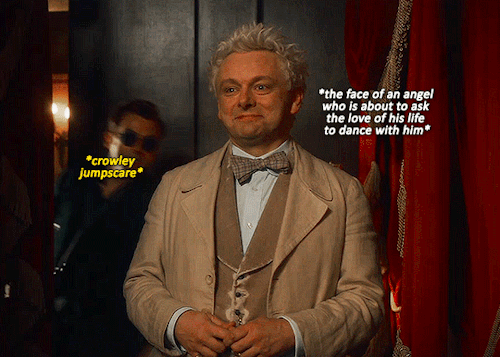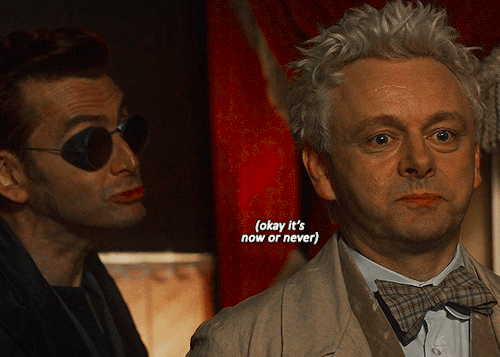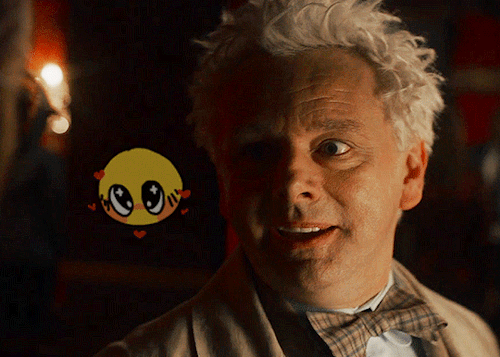If A Fella Makes A Nebula Right In Front Of You, How Are You Not Gonna Pine After Him For 6000 Years?

If a fella makes a nebula right in front of you, how are you not gonna pine after him for 6000 years?
More Posts from Fallencrow333 and Others








how to ask the demon you've been smitten over for 6000 years to dance: an angel's guide
bonus:








㋡🥀



Aziraphale's favorite color is yellow

For a friend, you are not a bad person. You are fantabulous and awesome
💙
I don’t know who needs to hear this today, but intrusive thoughts are basically your brain’s (sometimes very upsetting) way of saying “If there were two guys on the moon and one of them killed the other with a rock would that be fucked up or what?”
I’ve personally found that adding the “would that be fucked or what?” part in myself really helps put the more disturbing thoughts we sometimes get into perspective. Helps me say “yeah thar sure would be fucked up” and move on with my day.
It’s not a secret desire, it’s not something that only occurs to you because you’re a bad person. It’s just your brain deciding to process the fact that it knows an uncomfortable thing exists in the world by feeding it to you in an absurd “what if” with you as the main character.
Do you have any tips on how to write a character who’s being manipulated?
Your blog has been very helpful to me! :) thanks a lot
Quick Tips for Writing Manipulative Characters
To convincingly write a character who is being manipulated, you must first understand how to write a believable manipulator. Often hidden in plain sight, manipulators pull the strings, guiding the actions of those who are often unaware that they're dancing to someone else's tune.
Let’s look at manipulators as puppet masters, exploring how they function and how their actions echo throughout your story. By understanding the manipulator, you'll better equip yourself to create realistic characters who are unwittingly under their sway.
How do they behave?
Play the victim to garner sympathy
Charming and persuasive
Twist and distort the truth to suit their agenda
Play mind games
Are silver-tongued
Passive-aggressive when confronted
Use guilt to control others
Don’t hesitate to lie or deceive
Demonstrate a sense of entitlement.
Project their feelings onto others
How do they interact?
Play different roles with different people
Prefer indirect communication to direct confrontation
Gaslight others, making them doubt their own perceptions
Shift the blame onto others
Exploit others' vulnerabilities
Use people’s secrets against them
Make others feel obligated or in debt to them
Use flattery to get their way
Create conflict between other characters
Deliberately create confusion and chaos
Describe their body language
Maintain intense eye contact
Use touch to seem friendly and intimate
Facial expressions often don't match their words
Use large, expressive gestures to dramatise
Have a confident and exaggerated posture
Soften expression to look more trustworthy
Smile artificially or excessively
Lean in close, invading personal space
Mirror others’ behaviours to seem more likeable
Mimic emotions they may not feel
Describe their attitudes
Believe they are always right
Feel entitled and superior
Lack empathy
Highly competitive
Often impatient and intolerant
Controlling and like to be in charge
Rarely apologize sincerely
Often play the martyr, acting self-sacrificing
Can be sceptical of others’ intentions
Kindness is often an act
Positive narrative effects
Paradoxically, manipulative characters can have a positive narrative effect on those they manipulate. These characters can act as a catalyst for change, pushing others to unlock hidden potential and indirectly teaching them to be more cautious. In the face of manipulation, characters can mature and grow resilience.
Manipulative characters can also reveal people’s true natures by tricking them into revelations or by fostering unity as others band together against them. Furthermore, their actions can create dramatic plot twists, make people question their own perceptions and realities, and add intrigue.
Negative narrative effects
Manipulators can cause emotional and psychological distress, breed distrust and insecurity, and disrupt relationships and friendships. These characters often lead others to make damaging decisions, creating a toxic environment.
By exploiting and exposing others' vulnerabilities, manipulators make individuals question their self-worth. The extent of their manipulation can even cause physical harm and lead to the downfall of other characters. Their lasting legacy? Emotional scars that define their victims long after the manipulator has exited the narrative.
Frodo: *stabbed by an immortal blade*
The Hobbits: What do we do Mr. Strider
The Hobbits: *looking to this big scary mountain man so intimidating and mysterious they don’t even know his real name*
Aragorn, truly just some guy at heart: I’m gonna call my dad

LOTR/The Hobbit character with Onion headlines just because I can




Gosh I just love book Legolas. He's immortal. He's a teenager. Elrond picks him instead of Glorfindel because he's average and won't draw attention to the Fellowship. He's the comic relief guy and resident Little Shit, but he can also shoot a Nazgul out of the sky in the pitch black like a one-man elf anti-aircraft defense system. He wants everyone to know that he's, like, really old. He forgets the task at hand because he wants to look at trees. His greatest qualities are that he can become friends with anyone and his loyalty is unending. He shows up to Valinor a century late with Starbucks in hand and his dwarf bestie at his side. Iconic.
-
 samstarium liked this · 2 weeks ago
samstarium liked this · 2 weeks ago -
 yoko-hasagagua liked this · 2 weeks ago
yoko-hasagagua liked this · 2 weeks ago -
 sheid-thumbs-up liked this · 2 weeks ago
sheid-thumbs-up liked this · 2 weeks ago -
 roo-cifer liked this · 2 weeks ago
roo-cifer liked this · 2 weeks ago -
 nanysichok liked this · 2 weeks ago
nanysichok liked this · 2 weeks ago -
 xoticimage liked this · 2 weeks ago
xoticimage liked this · 2 weeks ago -
 bluessyrupp liked this · 2 weeks ago
bluessyrupp liked this · 2 weeks ago -
 navirose liked this · 2 weeks ago
navirose liked this · 2 weeks ago -
 bubulrouge liked this · 3 weeks ago
bubulrouge liked this · 3 weeks ago -
 karahkat liked this · 3 weeks ago
karahkat liked this · 3 weeks ago -
 madsgellertisnotdead reblogged this · 3 weeks ago
madsgellertisnotdead reblogged this · 3 weeks ago -
 madsgellertisnotdead liked this · 3 weeks ago
madsgellertisnotdead liked this · 3 weeks ago -
 morakit24 liked this · 3 weeks ago
morakit24 liked this · 3 weeks ago -
 kata6282 liked this · 3 weeks ago
kata6282 liked this · 3 weeks ago -
 optimistka13 liked this · 3 weeks ago
optimistka13 liked this · 3 weeks ago -
 freshlightcandy liked this · 3 weeks ago
freshlightcandy liked this · 3 weeks ago -
 aziraphale-likes reblogged this · 4 weeks ago
aziraphale-likes reblogged this · 4 weeks ago -
 witnessing-the-horrors liked this · 4 weeks ago
witnessing-the-horrors liked this · 4 weeks ago -
 bertungoals liked this · 4 weeks ago
bertungoals liked this · 4 weeks ago -
 valkyriemalison liked this · 4 weeks ago
valkyriemalison liked this · 4 weeks ago -
 themacawvoice liked this · 4 weeks ago
themacawvoice liked this · 4 weeks ago -
 emaebrshk liked this · 4 weeks ago
emaebrshk liked this · 4 weeks ago -
 midnightdemonz reblogged this · 4 weeks ago
midnightdemonz reblogged this · 4 weeks ago -
 midnightdemonz liked this · 4 weeks ago
midnightdemonz liked this · 4 weeks ago -
 avantorcastell liked this · 1 month ago
avantorcastell liked this · 1 month ago -
 ameltedmess liked this · 1 month ago
ameltedmess liked this · 1 month ago -
 vargdottern liked this · 1 month ago
vargdottern liked this · 1 month ago -
 aracidae liked this · 1 month ago
aracidae liked this · 1 month ago -
 perfectlydecaffeinatedstrawberry liked this · 1 month ago
perfectlydecaffeinatedstrawberry liked this · 1 month ago -
 rr984507 liked this · 1 month ago
rr984507 liked this · 1 month ago -
 dgfanart-toh liked this · 1 month ago
dgfanart-toh liked this · 1 month ago -
 a-strange-grey liked this · 1 month ago
a-strange-grey liked this · 1 month ago -
 livhatesbeans liked this · 1 month ago
livhatesbeans liked this · 1 month ago -
 thornsandflowersatemybrain liked this · 1 month ago
thornsandflowersatemybrain liked this · 1 month ago -
 before-the-fall reblogged this · 1 month ago
before-the-fall reblogged this · 1 month ago -
 ivanhoe1820 liked this · 1 month ago
ivanhoe1820 liked this · 1 month ago -
 artkiddisease liked this · 1 month ago
artkiddisease liked this · 1 month ago -
 gubernia liked this · 1 month ago
gubernia liked this · 1 month ago -
 okpokpokpolppl liked this · 1 month ago
okpokpokpolppl liked this · 1 month ago -
 thepot-inc liked this · 1 month ago
thepot-inc liked this · 1 month ago -
 kaiserde liked this · 1 month ago
kaiserde liked this · 1 month ago -
 biingpot reblogged this · 1 month ago
biingpot reblogged this · 1 month ago -
 stoatontoast23 liked this · 1 month ago
stoatontoast23 liked this · 1 month ago -
 foundontheforestfloor reblogged this · 1 month ago
foundontheforestfloor reblogged this · 1 month ago -
 smurfic66 liked this · 1 month ago
smurfic66 liked this · 1 month ago -
 voidyssey liked this · 1 month ago
voidyssey liked this · 1 month ago -
 koperek-w-pude1ku-po-1odach liked this · 1 month ago
koperek-w-pude1ku-po-1odach liked this · 1 month ago -
 ye-olde-reblog-blog liked this · 1 month ago
ye-olde-reblog-blog liked this · 1 month ago -
 p3tal-vein3d reblogged this · 1 month ago
p3tal-vein3d reblogged this · 1 month ago

210 posts